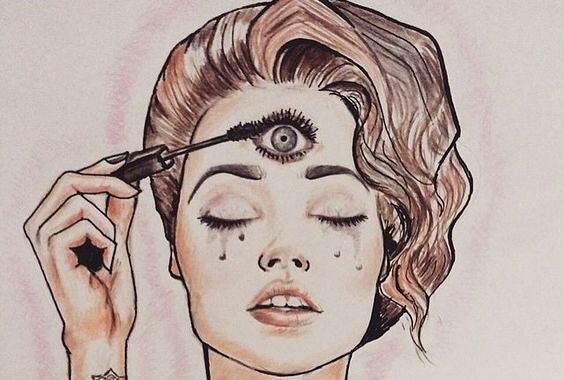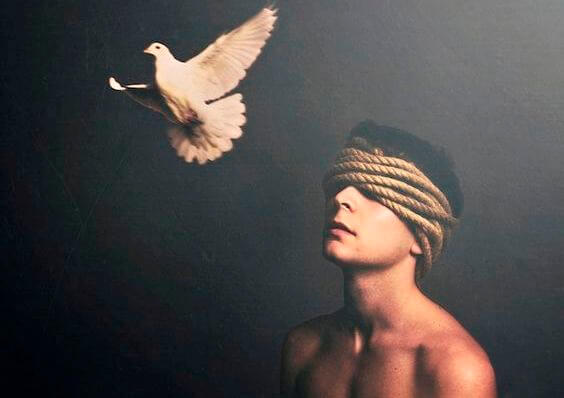There's No Turning Back Once Your Eyes Have Been Opened

There are wounds that, instead of opening up our skin, open up our eyes. Once our eyes have been opened there is no other option but to take the broken fragments of our lost happiness and to try to rebuild our own dignity. We need to find the self-esteem we need to be able to carry on with our head held high, looking firmly to the future and not looking back, without begging for the impossible.
Becoming aware of the reality of a situation doesn’t always come after a painful event hits us without warning and without anesthesia. Sometimes it happens in a more subtle way, when many smaller things combine to make something bigger, like a discreet but persistent rumor that in the end convinces us of something that perhaps we suspected almost from the beginning.
“The truth perseveres and does not break; it always walks over the lies like oil on water”
–Miguel de Cervantes-
Talking from a more spiritual point of view, it is common to speak of what is known as the “third eye”. It is certainly an interesting and unusual concept that has much to do with this same idea. For Buddhism and Hinduism our consciousness is located in this “eye”, as well as a personal intuition that helps us to experience a personal awakening. A new state of being in which we can perceive certain things that at other times escape us.
That is perhaps the biggest problem we have: we look but we do not see. Sometimes we drift along following our routines until, finally, we become dissatisfied. It is also quite common for us to let ourselves be caught up in certain relationships in which we give everything, without realising that what we get in return is the chalice of unhappiness.
To open our eyes to these realities isn’t a simple awakening of our conscience, it is an act of personal responsibility.

We look but we don’t see: it’s time to open our eyes
It was Aristotle himself who once said that our senses simply capture the image of the outside world as a whole. In this sense, we will only see the truth when there is a clear willingness on our part to do so, because that is when our mind truly connects with everything that surrounds it and everything that is being revealed to us.
Achieving this is not easy. It takes a clear intention, intuition, a critical mind and, above all, courage to see situations and circumstances as they really are and not as we would like them to be. To say that many of us walk through life blindfolded may sound rather bleak. However, when people look for a therapist to try and find the source of their anxiety, tiredness, bad moods and the apathy that takes away all their vitality, then the counsellor usually makes several discoveries.
One of them is our total resistance to seeing things as they really are. “My partner loves me. OK, maybe sometimes he treats me badly, but when we sort things out then he becomes that wonderful person who loves me so much again” or “Yes, in the end I had to finish the relationship with that girl because my parents didn’t like her, but they have always known what was best for me ...”

People often refuse to see things as they really are for many different reasons: for fear of seeing themselves as they really are, for fear of having to face the truth, for fear of loneliness and of not knowing how to react … This psychological resistance is a mental obstacle: a fence that acts as defense mechanism that drives away our happiness.
We cannot forget that happiness is, above all, an act of responsibility. Because when we finally get hold of it, when we truly open our eyes, then there is no turning back: it is time to act.
Learning how to open your eyes
A simple, practical and useful way of learning how to open our eyes to the truth is to let our mind rest. We realise this might sound a bit strange but it isn’t a matter of silencing it, turning it off or of removing the keys to the engine of our mental processes. It is simply to slow down, to somehow ignite that “third eye” that the Buddhists speak of.
“The truly important things are always invisible to the eyes”
– The Little Prince (Antoine de Saint-Exupéry)
We’ll show you the steps you need to take:
- Find a restful place, free of any stimuli that any of your senses could pick up (sounds, smell, physical sensations of cold or pressure of any sort).
- When we try to quieten the mind, it is quite normal that annoying intrusive and useless thoughts immediately fill our minds: things we have done or said, things that have happened to us, and things that other people have told us …
- Whenever one of these intrusive thoughts comes to you, visualize a stone that is thrown into a pond. Imagine how it hits the surface of the water and then disappears.

- As we start to be able to control and reject these intrusive and unhelpful thoughts, fears and troubles will start to come into our minds, and even memories that are engrained in our subconscious and which we have not paid attention to (a false smile, a contemptuous look …).
- It is now time to reflect on those feelings and memories and ask why they make us feel bad. The important thing in this phase is to avoid excuses and quick assessments (my partner spoke to me harshly, but I must have provoked him). We should see things as they are, even if they seem harsh to us and we find them to be terribly painful.
For this exercise to bring results and allow us to open our eyes, we must practice it daily. The truth will come to us sooner or later and help us to remove the blindfold from our heart and undo the bolts that trapped us and left us feeling dissatisfied.
After this, we will no longer be the same and we’ll only have one option- a way out and a personal obligation: to look straight ahead, towards our own freedom and happiness. Looking back is now no longer permitted.
There are wounds that, instead of opening up our skin, open up our eyes. Once our eyes have been opened there is no other option but to take the broken fragments of our lost happiness and to try to rebuild our own dignity. We need to find the self-esteem we need to be able to carry on with our head held high, looking firmly to the future and not looking back, without begging for the impossible.
Becoming aware of the reality of a situation doesn’t always come after a painful event hits us without warning and without anesthesia. Sometimes it happens in a more subtle way, when many smaller things combine to make something bigger, like a discreet but persistent rumor that in the end convinces us of something that perhaps we suspected almost from the beginning.
“The truth perseveres and does not break; it always walks over the lies like oil on water”
–Miguel de Cervantes-
Talking from a more spiritual point of view, it is common to speak of what is known as the “third eye”. It is certainly an interesting and unusual concept that has much to do with this same idea. For Buddhism and Hinduism our consciousness is located in this “eye”, as well as a personal intuition that helps us to experience a personal awakening. A new state of being in which we can perceive certain things that at other times escape us.
That is perhaps the biggest problem we have: we look but we do not see. Sometimes we drift along following our routines until, finally, we become dissatisfied. It is also quite common for us to let ourselves be caught up in certain relationships in which we give everything, without realising that what we get in return is the chalice of unhappiness.
To open our eyes to these realities isn’t a simple awakening of our conscience, it is an act of personal responsibility.

We look but we don’t see: it’s time to open our eyes
It was Aristotle himself who once said that our senses simply capture the image of the outside world as a whole. In this sense, we will only see the truth when there is a clear willingness on our part to do so, because that is when our mind truly connects with everything that surrounds it and everything that is being revealed to us.
Achieving this is not easy. It takes a clear intention, intuition, a critical mind and, above all, courage to see situations and circumstances as they really are and not as we would like them to be. To say that many of us walk through life blindfolded may sound rather bleak. However, when people look for a therapist to try and find the source of their anxiety, tiredness, bad moods and the apathy that takes away all their vitality, then the counsellor usually makes several discoveries.
One of them is our total resistance to seeing things as they really are. “My partner loves me. OK, maybe sometimes he treats me badly, but when we sort things out then he becomes that wonderful person who loves me so much again” or “Yes, in the end I had to finish the relationship with that girl because my parents didn’t like her, but they have always known what was best for me ...”

People often refuse to see things as they really are for many different reasons: for fear of seeing themselves as they really are, for fear of having to face the truth, for fear of loneliness and of not knowing how to react … This psychological resistance is a mental obstacle: a fence that acts as defense mechanism that drives away our happiness.
We cannot forget that happiness is, above all, an act of responsibility. Because when we finally get hold of it, when we truly open our eyes, then there is no turning back: it is time to act.
Learning how to open your eyes
A simple, practical and useful way of learning how to open our eyes to the truth is to let our mind rest. We realise this might sound a bit strange but it isn’t a matter of silencing it, turning it off or of removing the keys to the engine of our mental processes. It is simply to slow down, to somehow ignite that “third eye” that the Buddhists speak of.
“The truly important things are always invisible to the eyes”
– The Little Prince (Antoine de Saint-Exupéry)
We’ll show you the steps you need to take:
- Find a restful place, free of any stimuli that any of your senses could pick up (sounds, smell, physical sensations of cold or pressure of any sort).
- When we try to quieten the mind, it is quite normal that annoying intrusive and useless thoughts immediately fill our minds: things we have done or said, things that have happened to us, and things that other people have told us …
- Whenever one of these intrusive thoughts comes to you, visualize a stone that is thrown into a pond. Imagine how it hits the surface of the water and then disappears.

- As we start to be able to control and reject these intrusive and unhelpful thoughts, fears and troubles will start to come into our minds, and even memories that are engrained in our subconscious and which we have not paid attention to (a false smile, a contemptuous look …).
- It is now time to reflect on those feelings and memories and ask why they make us feel bad. The important thing in this phase is to avoid excuses and quick assessments (my partner spoke to me harshly, but I must have provoked him). We should see things as they are, even if they seem harsh to us and we find them to be terribly painful.
For this exercise to bring results and allow us to open our eyes, we must practice it daily. The truth will come to us sooner or later and help us to remove the blindfold from our heart and undo the bolts that trapped us and left us feeling dissatisfied.
After this, we will no longer be the same and we’ll only have one option- a way out and a personal obligation: to look straight ahead, towards our own freedom and happiness. Looking back is now no longer permitted.
This text is provided for informational purposes only and does not replace consultation with a professional. If in doubt, consult your specialist.







